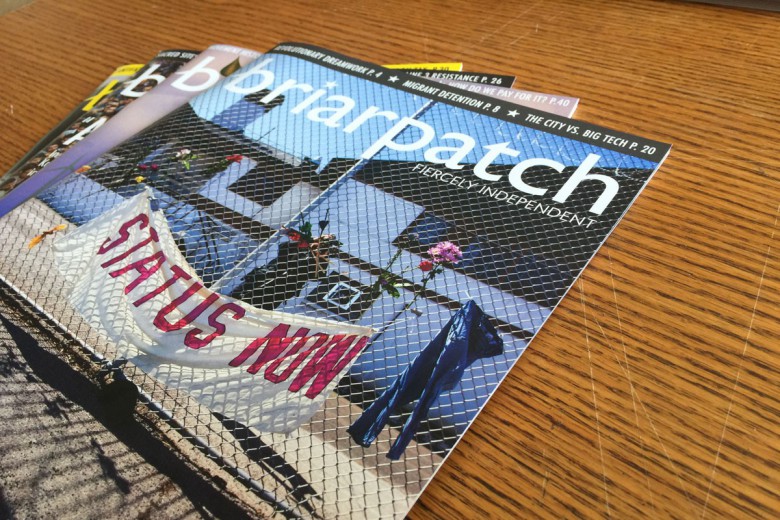Late this summer, Briarpatch’s sibling publication, the Sask Dispatch, applied for funding from the Google News Equity Fund. When Google got back to us with a funding offer, it sparked a series of conversations in the Briarpatch office about the ethics of taking this money, and what the recent influx of tech money reveals about our media ecosystem.
The Dispatch – which publishes news and commentary about Saskatchewan – was born into a difficult environment for media. For at least 20 years, large corporations have been buying up, gutting, and shuttering independent alt-weeklies and local papers. In a lot of Saskatchewan small towns, for example, daily papers might be like the Estevan Mercury: owned by Vancouver’s Glacier Media Group, covering an area of 700 square kilometres with a population of about 11,000 people, and staffed by what appears to be one editor, one reporter, and an anonymously-bylined, ambiguously -sized, indeterminably -located “staff.” The major dailies in the province, meanwhile, are ghost-ship versions of their former selves, skeleton crew and all. When, in 2016, newspaper behemoth Postmedia announced it would cut staffing costs by 20 per cent, the Regina Leader-Post lost eight journalists, over a fifth of its newsroom. The Leader-Post no longer publishes a print edition on Mondays, and broad swathes of the paper – news, sports, arts, and business alike – are simply hammered in from somewhere else in Postmedia’s empire to fill gaps in its hull.
Not all of this is Google’s fault – but a lot of it certainly is. Even before there was a computer in every home, newspapers were seeing their profits decline. But tech platforms raided one of print media’s main revenue drivers: advertising. Advertisers correctly intuited that they could simply reach people where they were at through Google ads and, later, branded accounts on Facebook, Instagram, and Twitter. In 2021, Google, Meta, and Amazon captured half of all the money spent on advertising globally – and three-quarters of the money spent on digital advertising.
They’re starting a variety of programs to purportedly “preserve,” “protect,” “support,” or otherwise “help” journalism while simultaneously lobbying aggressively against regulation that would force them to pay publishers.
Meanwhile, tech platforms like Google and Facebook made a lot of bank positioning themselves as a way for people to find the news – making an end run around media by profiting off their content while suctioning away their revenue. For example, Google’s “first click free” policy used to force publishers to offer readers free access to paywalled articles that appeared in Google search results. This is the basis for efforts from governments in an increasing number of countries – including Canada – to make Alphabet (Google’s parent company), Meta (Facebook’s parent company), and other digital firms pay for reproducing or sharing news outlets’ content.
In response, tech companies are making another end run, this time around legislators. They’re starting a variety of programs to purportedly “preserve,” “protect,” “support,” or otherwise “help” journalism while simultaneously lobbying aggressively against regulation that would force them to pay publishers. These programs include Google’s Journalist Studio, which provides tools and training to reporters; Meta’s Journalism Project, which funds community-based news and fact checks misinformation; and Google’s News Equity Fund, which resources newsrooms that serve underrepresented communities. Even Microsoft is in on the act with their own journalism initiative, with pilot programs in several U.S. cities.
Tech platforms aren’t offering these programs because they’re generous and kind corporate global citizens or because they believe in the importance of the Fourth Estate. They caused the problem, and to avoid accountability, they’re branding themselves as part of the solution.
A 2019 report by the Tech Transparency Project shows that when a country considers regulating or suing Google, Google suddenly begins to pour millions of dollars into journalism programs there. In 2012, France and Germany proposed forcing search engines to pay publishers for republishing their articles – and in 2013, Google funded 45 French media projects to the tune of over $37 million. In 2015 the European Union was considering taxing internet firms for showing copyrighted material and announced that Google would be charged with antitrust violations – and in 2016, Google funnelled $92.4 million into 258 projects in Europe (plus 18 awards worth an undisclosed amount).
“[A] Google executive asked European media companies that had received grants to lobby on its behalf against tighter E.U. copyright rules, which the company staunchly opposed.”
Tech corporations go out of their way to stress that editorial independence is a condition of their funding. But money always comes with visible or invisible strings attached – which is why journalists have long balked at accepting funding from industries that they cover. What’s different now is the unprecedentedly desperate situation in which many journalists and media orgs find themselves. Many of them are already feeling incredible pressure to do whatever it takes to make sure the money tap doesn’t turn off.
And Google has shown that it’s willing to pay for good press and friends in high places. In June 2018, the Tech Transparency Project reports, “a Google executive asked European media companies that had received grants to lobby on its behalf against tighter E.U. copyright rules, which the company staunchly opposed.” Two weeks later, it was reported that Google paid £500,000 to London’s Evening Standard newspaper in exchange for positive news stories and op-eds.
Since 2018, Google’s focus has shifted to North America. During that time, Google’s been in hot water in the U.S. and Canada – the U.S. Justice Department sued Google for violating antitrust laws, and presidential contenders like Elizabeth Warren began talking about breaking up tech monopolies.
Right on cue, 2018 saw a torrent of Google funding into the U.S. and Canada. That year, the Tech Transparency Project found 66 grants and other Google awards in the U.S. worth at least US$4 million – a conservative estimate. “That was more than the total number of U.S. awards it made in 2015 and 2016 combined and more in dollar terms than at any point in the decade we examined,” the report notes.
Now, it seems, Google and Meta are responding to the threat of Canada’s Bill C-18, the Online News Act, a pay-to-republish bill similar to the one in Germany. In the days while I was writing this piece, Google’s blog published an entry titled “It’s time to fix Bill C-18” that calls the legislation “unworkable for platforms and unreasonable from a business standpoint.”
Though tech giants are funnelling millions into reputation-laundering journalism “support,” they’re making a shrewd calculation – because it’s still far less than they would be forced to pay if they were subject to regulation like Bill C-18. Alphabet is spending US$300 million over three years on the Google News Initiative, but the Standing Committee on Canadian Heritage predicted that Bill C-18 would see tech companies pay around C$150 million every single year to Canadian news outlets.
Google’s funding would have allowed us to double the Dispatch’s staff and the number of stories we publish.
In November, after much back-and-forth, we decided to accept Google’s funding for the Sask Dispatch. We were excited to use the money to hire a part-time reporter, and we were comforted by the fact that Google had guaranteed us editorial independence. Meanwhile, Saima, Briarpatch's editor, asked me to write this article expanding on my hesitations. But after editing my draft, and looking into Google’s pattern of investing in journalism to evade regulation, she called an office meeting. She’d changed her mind. We read the Tech Transparency Project’s report and discussed our concerns.
Six weeks after we told Google we’d accept their funding, we sent another email, telling them we weren’t going to take their money.
It was a hard decision to make. The Dispatch currently publishes six times a year, and we can afford to employ a part-time editor for roughly ten hours a week – enough to publish maybe one or two features about Saskatchewan each month. Google’s funding would have allowed us to double the Dispatch’s staff and the number of stories we publish. Even that small increase in journalistic capacity would have made a big difference in the media wasteland that is Saskatchewan. Many people in our home province have no alternative to corporate media and, indeed, a lot of people get their news from a company, Rawlco Radio, with explicit ties to the province’s right-wing Saskatchewan Party. By rejecting Google’s funding, we’re deliberately choosing a path forward for progressive, local journalism that, while in line with our principles, is in practice difficult to walk.
At Briarpatch and the Dispatch, we put our reporting and our credibility first, sometimes at the expense of funding relationships. Provincial funding, federal funding, advertising relationships – you name it, we’ve turfed it, and we’ll gladly do it again. (Keen-eyed readers might even have noticed that this happened to us once again in 2022!) Because the majority of our funding comes from readers – in the form of subscriptions, donations, and sustaining memberships – we’re more accountable to the collective interests of the thousands of people who chip in a few bucks than we are to a single wealthy individual, company, or government program. It’s this independent backing that has allowed us to freely and stridently criticize tech companies in the pages of Briarpatch – for example, reporting on the shady private-public-private partnership between Google’s Sidewalk Labs and Waterfront Toronto – and allows us to retain our credibility in any critiques of Big Tech we’ve yet to publish.
“The keystone of a democratic platform is that the people who use it must control it.”
But it would be goofy at best, and dangerously in denial at worst, to suggest all of this made our decision to reject Google’s funding anything other than thorny and fraught. After all, solutions to the crisis facing Canadian media are thin on the ground.
As critics like journalist James Ball have pointed out, tech giants have thrown a wrench into not just media, but all facets of public life with their many-pronged approaches to tax avoidance. And while Bill C-18 does aim to shift the balance of power away from tech giants, it’s far from a real solution. Analysis suggests that of the C$150 million per year the Online News Act would funnel into the news industry, three-quarters of that would go to broadcasters like the CBC, Bell, Shaw, and Rogers, while independent and local media outlets would be stuck fighting over the scraps. In other words, we have to go further, and we have to start at the grassroots.
In “Platforms for people, not profit,” a piece in Briarpatch’s January 2020 issue, Daniel Joseph laid out a number of potential ways to nationalize, democratize, and, most importantly, detach from the noxious monster of Big Tech. Regardless of the proposal – from regulation to workplace organizing to outright nationalization of those platforms – he writes, “the keystone of a democratic platform is that the people who use it must control it.”
For the time being, independent media outlets hoping to survive and grow are left with a series of tough choices. But those choices can be made easier by building grassroots movements that can exert pressure on politicians to pass meaningful legislation, that can support indie media to be both sustainable and ferocious, and that can help us build a future in which the massive profits that Big Tech extracts can instead be shared by everyone. That’s the future Dispatch will be fighting for.







